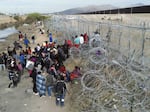
Hundreds of migrants set up camp on the Rio Grande, waiting for Texas National Guard agents to let them enter the border wall in Ciudad Juarez, Mexico on March 20, 2024. In the improvised camp there are infants and women, who sleep a few meters from gate 36 with the hope of being able to pass the knife fence.
Anadolu/Anadolu via Getty Images / Anadolu
President Joe Biden on Tuesday took executive action to temporarily suspend most asylum claims at the southern U.S. border when the seven-day average of unauthorized crossings exceeds 2,500.
Senior administration officials told reporters that the measures would take effect immediately.
Once the measure goes into effect, migrants who cross without authorization — absent exceptional circumstances — would not be eligible for asylum. Senior administration officials said they expect to remove these individuals “in a matter of days, if not hours.”
Also, migrants who cross the Southern border unlawfully and are processed for expedited removal would get a credible fear screening if they manifest a fear of returning to their country or their intention to apply for asylum. However, the threshold for credible fear would be increased.
The restrictions will remain in place until 14 days after the seven-day average of illegal crossings drops below 1,500. The measures will go back into effect once the number reaches 2,500.
Biden, who is running for reelection and has been facing criticism for the high number of migrants entering the United States, is relying on section 212(f) of the Immigration and Nationality Act to implement these restrictions.
This is the same law former President Donald Trump — who is challenging Biden in this year's election— used in 2017 to ban immigration from several majority-Muslim countries, and in 2018 to suspend the entry of migrants between ports of entry along the Southern border. As it happened during the Trump administration, Biden’s executive order is expected to be challenged by immigrant rights groups.
Amy Fischer, the Director of Refugee and Migrant Rights at Amnesty International USA, said in a statement that Biden’s actions “set a dangerous international precedent.”
“It’s deeply disappointing to see President Biden so hellbent on dismantling human rights for people seeking asylum and implementing policies that are plainly illegal under international and refugee law,” Fischer said.
Senior administration officials told reporters the U.S. will continue to return nationals from Cuba, Haiti, Nicaragua, and Venezuela to Mexico.
Migrants hailing from outside the Western Hemisphere will be subject to the provisions, although administration officials said it is a challenge.
“We are confident that the steps we are taking today are consistent with our obligations under international law,” an official said.

Border Patrol picks up a group of asylum seekers from an aid camp at the US-Mexico border near Sasabe, Arizona, US, on Wednesday, March 13, 2024. During the first four months of fiscal year 2024, Border Patrol recorded more than 250,000 migrant apprehensions in the Tucson sector in Arizona, the most of any region patrolled by the agency, according to federal government statistics, reports CBS.
Bloomberg/Bloomberg via Getty Images / Bloomberg
Using the Immigration and Nationality Act
The section 212(f) is a provision from the Immigration and Nationality Act (1952) which empowers the president to "suspend" or restrict the entry of migrants into the country when deemed necessary.
Bill Hing, a professor of law and migration studies at the University of San Francisco, said there are many laws that prevent certain immigrants from coming to the country, like those who are members of a terrorist organization.
However, section 212(f) is more encompassing.
“(It’s) much broader,” Hing said. “It just says that the President has the power through a proclamation to restrict the entry of people who are coming to the United States, in the opinion of the President, who are detrimental to the interest of the United States.”
Hing called the language of the law “ambiguous.”
The section has been used by Democratic and Republican presidents in the past to curtail illegal migration.
For instance, in 1981 President Ronald Reagan invoked it to restrict Haitians from coming into the U.S. He also used it to suspend the entry of Cubans, Nicaraguans part of the Sandinista National Liberation Front, and Panamanians officials under the dictatorship of Manuel Antonio Noriega.
Since then, section 212(f) has been used to block certain citizens from several countries, including China, Iran, Venezuela, Myanmar, Nigeria, Sudan, and Tanzania.
But most notoriously, it was invoked by President Donald Trump in January 2017, and was dubbed a “Muslim ban.” Trump’s executive order indefinitely ended the resettlement of Syrian refugees, and banned the entry of citizens of seven majority-Muslim countries for 90 days. President Biden revoked that executive order in 2021.
Biden’s decision
President Biden’s actions on Tuesday come as the numbers of unauthorized crossings in the U.S.-Mexico border have continued to go down in recent months, defying migration patterns.
In December, Border Patrol agents made nearly 250,000 encounters with migrants between the point of entries in the Southern border — a record high.
However, those numbers have sharply decreased. In April, U.S. Customs and Border Protection reported nearly 129,000 encounters.
Immigration policy analysts have said the numbers are due to Mexico’s enforcement of its own immigration law at their southern border with Guatemala and the northern border with the U.S.
Rolando Salinas, the mayor of Eagle Pass, Texas, questioned Biden’s timing for this announcement.
Eagle Pass has been the epicenter of Texas Gov. Greg Abbott’s fight with the Biden administration over its handling of immigration.
“I just wish this was done back in December when our city was being hit with 2-3 thousand people per day,” Salinas told NPR in a text message. “We won’t forget those days.”
Over the last few months, Biden has been announcing narrow policies at the border, including proposing a new rule intended to speed up the removal of some migrants ineligible for asylum.
Biden’s decision will likely be challenged in court by immigrant rights groups.
When he used section 212(f) in 2021 as part of his public health efforts during the COVID-19 pandemic, that's exactly what happened. Under his order, Biden suspended the entry of non-U.S. citizens who were within the United Kingdom, Ireland, Brazil, and South Africa during 14 days prior to their attempt to enter the United States.
It also applied to those who had been in the Schengen Area, which is made up of 29 European countries.
Lily Axelrod, an immigration attorney based in Memphis, Tenn., said that measure was “quite disruptive to business and family.”
Maribel Hernandez Perez, director of policy and government affairs for border and immigration at the ACLU, said Biden’s latest executive order will likely have a negative impact on the legal pathways of migration to the U.S.
“Whenever you do anything that bars people from applying for asylum, what you're doing is in fact disrupting the legal pathways that people have,” Hernandez Perez said.
She said Biden’s actions are a “missed opportunity” to take action to better manage illegal crossings at the Southern border.
“That is just a repeat of what President Trump did, that is just a repeat of cruel policies,” Hernandez Perez said.
Hernandez Perez added Biden should focus on his campaign promise of restoring the asylum system in the country.
Copyright 2024 NPR